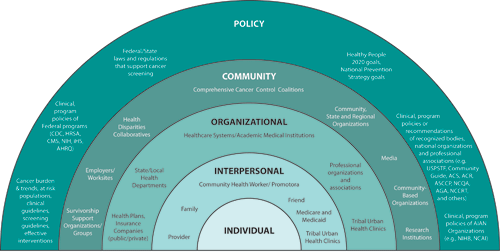Social Ecological Model

CDC adapted the social ecological model (SEM) of health promotion to represent the National Breast and Cervical Cancer Early Detection Program’s (NBCCEDP’s) multi-level approach to breast and cervical cancer prevention. The SEM is a systems model with multiple bands of influence. A rainbow-like figure of five bands represents the SEM. At the core of the model is the individual, surrounded by four bands of influence representing the interpersonal, organizational, community, and policy levels. NBCCEDP grantees implement public health activities at these five levels to maximize synergies of intervention for the greatest impact. Each of these bands of influence in the model is described below.
Individual Level
The innermost band of the SEM rainbow represents the individual who might be affected by the NBCCEDP. The NBCCEDP aims to increase the individual’s knowledge and influence her attitudes toward, and beliefs regarding—
- The need for breast and cervical cancer screening.
- The intention to be screened.
- The risks and benefits of screening.
- Access to affordable and convenient breast and cervical cancer screening, diagnosis, and treatment.
The NBCCEDP SEM highlights the importance of providing individuals with high-quality, appropriate breast and cervical cancer screening and surveillance and ensuring timely initiation of treatment for women who are diagnosed with cancer.
Interpersonal Level
The second band of the SEM rainbow surrounds the individual band and represents breast and cervical cancer prevention activities implemented at the interpersonal level. These activities are intended to facilitate individual behavior change by affecting social and cultural norms and overcoming individual-level barriers. Friends, family, health care providers, community health workers or promotoras, and patient navigators represent potential sources of interpersonal messages and support. The NBCCEDP SEM highlights several interventions appropriate for this level, including—
- Providers making screening recommendations to their patients.
- Patients receiving reminders about the need of screening.
- Patient navigators helping to remove logistical and other barriers to screening.
Organizational Level
The third band of the SEM rainbow surrounds the interpersonal band and represents breast and cervical cancer prevention activities implemented at the organization level. These activities are intended to facilitate individual behavior change through by influencing organizational systems and policies. Health care systems, employers or worksites, health care plans, local health departments, tribal urban health clinics, and professional organizations represent potential sources of organizational messages and support. The NBCCEDP SEM highlights several interventions appropriate for this level, including—
- Promoting the use of client and provider reminder systems.
- Providing provider assessment and feedback on their performance.
- Encouraging the coverage and expansion of benefits for screening.
- Adopting worksite policies that support preventive care.
Community Level
The fourth band of the SEM rainbow surrounds the organizational band and represents breast and cervical cancer prevention activities implemented at the community level. These activities are intended to facilitate individual behavior change through by leveraging resources and participation of community-level institutions such as comprehensive cancer control coalitions, tribal health departments, media, and community advocacy groups, which represent potential sources of community communication and support. The NBCCEDP SEM highlights several interventions appropriate for this level, including—
- Working with coalitions and collaboratives to promote breast and cervical cancer screening and expand resources.
- Conducting public awareness and educational campaigns.
- Collaborating with tribal health departments to expand breast and cervical cancer screening.
Policy Level
The fifth and outermost band of the SEM rainbow surrounds the community band and represents breast and cervical cancer prevention activities at the policy level. These activities involve interpreting and implementing existing policy. Federal, state, local, and tribal government agencies may support policies that promote healthy behavior, including screening. Examples include—
- Collaborating with coalitions to communicate policy decisions to the public (for example, insurance mandates for screening).
- Translating local policies for community members (for example, proclamation by a mayor for breast cancer awareness month).
- Page last reviewed: August 1, 2013
- Page last updated: January 28, 2013
- Content source:
- Maintained By:


 ShareCompartir
ShareCompartir